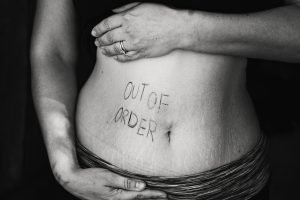 If you get up from a meal feeling like your stomach is ready to pop or that if someone poked a pin in your belly, you’d fly around the room like a released balloon letting the air out. Nobody likes to feel gassy or bloated, but sometimes, feeling bloated can be a good thing. That’s right. Besides the fact that it encourages you to walk off the bloat, the key to why it’s good, lies in the reason you’re bloated. If it came from eating a diet that’s based on less animal products and is more plant-based, with a higher fiber content, just appreciate the fact you’re improving your health and realize that it won’t always feel that way.
If you get up from a meal feeling like your stomach is ready to pop or that if someone poked a pin in your belly, you’d fly around the room like a released balloon letting the air out. Nobody likes to feel gassy or bloated, but sometimes, feeling bloated can be a good thing. That’s right. Besides the fact that it encourages you to walk off the bloat, the key to why it’s good, lies in the reason you’re bloated. If it came from eating a diet that’s based on less animal products and is more plant-based, with a higher fiber content, just appreciate the fact you’re improving your health and realize that it won’t always feel that way.
More plant-based food means more fiber.
Food that sticks around for a while tends to cause gas. Plant-based foods, particularly those high in fiber fit that description. People can’t digest fiber, but the bacteria in their digestive system thrives on it. It occurs because the bacteria are digesting it and their bi-product is gas. It’s a pre-biotic that helps build healthy colonies in your colon. You not only get the benefit of better health; you also feel full longer when you eat high fiber food.
Some macronutrient-type fiber creates more gas.
A small study on bloating found that people switching from a diet low in fiber to in high in fiber all experienced some bloating. There was a difference, however, in which type of macronutrient fibers gave them the most gas. People who ate fiber that was rich in protein, like seeds, peanut butter, bens and nuts, tended to have far more bloating and gas than those who ate food like oats, brown rice and whole grains, which are carbohydrate-rich sources. In fact, the difference was significant. The higher protein fiber increased bloating by about 40%.
It’s all about timing.
The body needs the right type of bacteria to digest a high fiber meal. If you don’t have enough of those, the result is bloating. By introducing fiber into your diet slowly, you’ll reduce bloating and let your body ease into a higher fiber diet. Slowly increase the fiber and make sure you drink plenty of water. There are two types of fiber, soluble and insoluble. The soluble fiber attracts water and turns to a gel. Insoluble adds bulk. Adding water helps replenish the fluid required for soluble fiber and keeps your system moving, while preventing gas.
- Everyone is different and so are the microbiome in their gut. You may find that certain high fiber foods give you more gas than others, based on the type of bacteria that’s most prevalent in your stomach.
- Sometimes, it’s not what you eat that gives you gas, but how fast you eat. You may be swallowing air when you’re eating fast. Slow down, be aware that other things like chewing gum, drinking through a straw and smoking also cause you to swallow air.
- If gas becomes a serious problem and slowing down didn’t help, try moving after meals. Simply walking around can help aid digestion and relieve much of the bloating you’ve experienced.
- Introducing fiber into the diet too fast can do more than just create bloating and gas, it can cause constipation. Increasing your water intake as you increase your fiber intake helps prevent this.
For more information, contact us today at Iron Fit San Antonio
